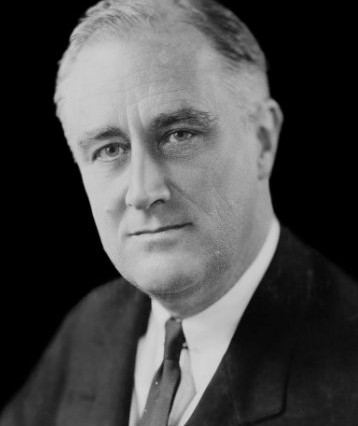Introduction
Having just returned from a trip across nine states to see the effects of the then-ongoing Dust Bowl and drought, on September 6, 1936—two months before the next election, and with the country still in the midst of the Great Depression—President Franklin D. Roosevelt (1882–1945) spoke directly to the American people in one his famous evening radio addresses. In his eighth “fireside chat,” he acknowledges the nation’s dire economic condition and outlines government relief efforts. Roosevelt also reminds “brain workers and manual workers” of their mutual reliance upon one another, urging Americans to join together to secure their “economic freedom”—just as our forefathers had fought to secure our “political freedom.”
According to President Roosevelt, Labor Day is a national holiday, not a class holiday. Americans insist, he says, that the relation between employer and employee should be “one between free men and equals.” Can you explain what he means by these claims? He ends by comparing Labor Day and the Fourth of July and by discussing the relation between economic freedom and political freedom. Which holiday—and which freedom—is more important for you as an American citizen?
Tomorrow is Labor Day. Labor Day in this country has never been a class holiday. It has always been a national holiday. It has never had more significance as a national holiday than it has now. In other countries the relationship of employer and employee has been more or less accepted as a class relationship not readily to be broken through. In this country we insist, as an essential of the American way of life, that the employer-employee relationship should be one between free men and equals. We refuse to regard those who work with hand or brain as different from or inferior to those who live from their property. We insist that labor is entitled to as much respect as property. But our workers with hand and brain deserve more than respect for their labor. They deserve practical protection in the opportunity to use their labor at a return adequate to support them at a decent and constantly rising standard of living, and to accumulate a margin of security against the inevitable vicissitudes of life.
The average man must have that twofold opportunity if we are to avoid the growth of a class-conscious society in this country.
There are those who fail to read both the signs of the times and American history. They would try to refuse the worker any effective power to bargain collectively, to earn a decent livelihood and to acquire security. It is those shortsighted ones, not labor, who threaten this country with that class dissension which in other countries has led to dictatorship and the establishment of fear and hatred as the dominant emotions in human life.
All American workers, brain workers and manual workers alike, and all the rest of us whose well-being depends on theirs, know that our needs are one in building an orderly economic democracy in which all can profit and in which all can be secure from the kind of faulty economic direction which brought us to the brink of common ruin seven years ago.
There is no cleavage between white-collar workers and manual workers, between artists and artisans, musicians and mechanics, lawyers and accountants and architects and miners.
Tomorrow, Labor Day, belongs to all of us. Tomorrow, Labor Day, symbolizes the hope of all Americans. Anyone who calls it a class holiday challenges the whole concept of American democracy.
The Fourth of July commemorates our political freedom—a freedom which without economic freedom is meaningless indeed. Labor Day symbolizes our determination to achieve an economic freedom for the average man which will give his political freedom reality.
Return to The Meaning of Labor Day.



Post a Comment